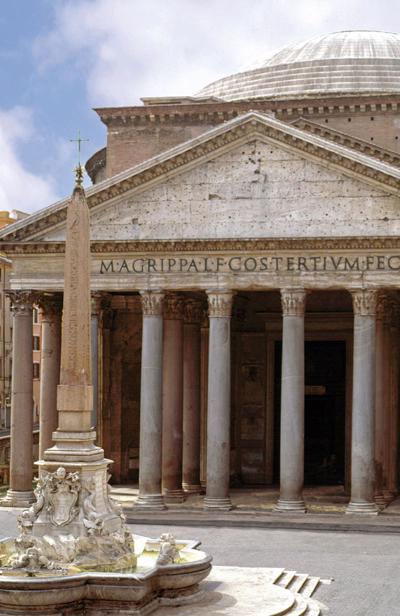Digital Portfolio
The Pantheon is the last remaining dome of the Imperialist era. It stands as an imperial monument. The temple is dedicated to Agrippa, Julius Caesar's right hand man. Hadrian commissioned it on 125 B.C. On the front of the Pantheon, there is an inscription on the temple that says “ M.Agrippa.L.F.Cos.Tertium.Fecit.” Translated, it means "Marcus Agrippa, son of Lucius, in his third consulate, made it.” The better translation that Hadrian meant to say that Agrippa was the reason, or even helped with, the Pantheon for being built. There is a big circular rook in the middle of the Pantheon that opens up to the sky above. The diameter of the roof is 8.8 meters in diameter. There is a drain in the middle of the building that collects the water that fall ins in the temple.The Pantheon was originally in the place of two buildings that were destroyed. The first building, made by Marcus Vipsanius Agrippa, was destroyed in a fire in 80 B.C. The second building, by Domitian, was struck by lightning in 110 B.C. A couple of years later, the dome was then appropriated to be a Christian church around 608 A.D. The temple is still a working church.
jordynlang
12 chapters
15 Apr 2020
Pantheon
January 22, 2019
|
Rome, Italy
The Pantheon is the last remaining dome of the Imperialist era. It stands as an imperial monument. The temple is dedicated to Agrippa, Julius Caesar's right hand man. Hadrian commissioned it on 125 B.C. On the front of the Pantheon, there is an inscription on the temple that says “ M.Agrippa.L.F.Cos.Tertium.Fecit.” Translated, it means "Marcus Agrippa, son of Lucius, in his third consulate, made it.” The better translation that Hadrian meant to say that Agrippa was the reason, or even helped with, the Pantheon for being built. There is a big circular rook in the middle of the Pantheon that opens up to the sky above. The diameter of the roof is 8.8 meters in diameter. There is a drain in the middle of the building that collects the water that fall ins in the temple.The Pantheon was originally in the place of two buildings that were destroyed. The first building, made by Marcus Vipsanius Agrippa, was destroyed in a fire in 80 B.C. The second building, by Domitian, was struck by lightning in 110 B.C. A couple of years later, the dome was then appropriated to be a Christian church around 608 A.D. The temple is still a working church.

Share your travel adventures like this!
Create your own travel blog in one step
Share with friends and family to follow your journey
Easy set up, no technical knowledge needed and unlimited storage!